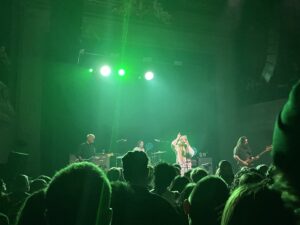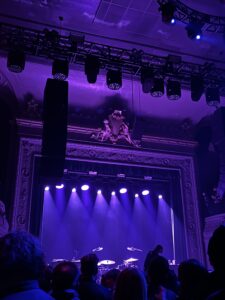By Brock Hrehor

Few modern bands embody contrast quite like Dry Cleaning. As innovative as they are anachronistic, the London-based post-brexit band seamlessly blends instrumentals reminiscent of Joy Division and Wire with frontwoman Florence Shaw’s spoken word, absurdist vocals. Having been invested in the band’s unique sound since the release of their 2021 debut album, New Long Leg, I jumped at the chance to see them on tour in support of their sophomore release, Stumpwork.
After driving past numerous car crashes and a flame-engulfed building in Oakland, as well as watching a heavily-armed grouping of officers rush into our bart station to investigate the bomb threat that delayed our train, I sadly concluded that my two companions and I would be missing Nourished by Time, the openers that we were currently missing. As I sat in our train to San Francisco, chatting with a Berkeley student about their study abroad experience frequenting KitKatClub (the infamous Berlin fetish club), however, my previous overstimulation and hesitance of the night began to melt away, slowly being replaced by an increasing excitement for the upcoming show.
The venue only served to enhance the surreal nature of the band – and the night as a whole. Stepping into the entrance of August Hall, a Victorian building erected in the late 19th century, I was met with the familiar buzzing of pre-show anticipation amidst Art-Nouveau columns and statues of cherubim. Graying hipsters and college-aged music nerds made up the majority of the crowd, and soon enough, Dry Cleaning (composed of vocalist Florence Shaw, guitarist Tom Dowse, bassist Lewis Maynard and drummer Nick Buxton) took the stage and, without introducing themselves, abruptly began to play.

The band opened with “Kwenchy Kups,” one of my personal favorites, named after a saccharine child’s treat initially popularized in the U.K in the 90s, followed by “Gary Ashby,” inspired by a lost tortoise of the same name. Shaw spoke little between songs, and besides requisite sips from her newly opened beer can, stopped to speak briefly only with:
“We saw there was an anti-abortion protest here earlier… anyway, fuck those guys.”
This comment was met with cheers from the audience, and Shaw took a break once more to compliment a member of the crowd’s “hypnotizing hip swivels.” Apart from this, the band was completely locked into their performance, in which the controlled, rhythmic intensity of Meynard and Buxton was punctuated by Dowse’s angular guitar riffs. This set the backdrop for Shaw’s languid vocals, whose lyrical content ranges from the everyday and mundane to the completely absurd – and often draws surprising parallels between the two.
“Spent seventeen pounds on mushrooms for you… ‘cause I’m… silly,” remarked Shaw, shaking a maraca over primitive drums and bass before Dowse filled the hall with an undulating, hypnotic guitar riff. It’s lines like these, when delivered in such a monotone, droning verse, that make it seem as if Shaw is aware of the band’s ability to snap the listener back and forth from reality, and gets a sort of enjoyment from their proficiency in doing so.
The combative nature of the band was further revealed by the concert’s lighting, in which Shaw was often presented in stark opposition to the rest of the band, such as during the song “Hot Penny Day,” where she was immersed in a bright red spotlight, situated over an entirely blue background. Floodlights signified the end of each song, eliciting a call-back from the audience and further developing the dialogue between performer and fan.
Although their careful balance of opposites is a distinct characteristic of this group, their performance dynamics never once seemed as if they relied strictly on that, and the immense talents – as well as versatility – of all of the performers was crystal clear. Buxton, for example, stood up from his drum set to play a smooth saxophone line on the first half of “Anna calls from the Arctic,” turning on a drum machine to keep the time, and Shaw momentarily brought out and played the melodica. The performance was almost indistinguishable from the sound and quality of their studio albums, and I was greatly impressed by the group’s cohesion. It was clear that they knew exactly how to play to their strengths in order to produce something more than the sum of their parts.
The performance was fantastic. I could go on and on trying to put this band into words, but nothing can explain them quite as well as listening to their music, or better yet, experiencing them live. You’d be hard-pressed to find another contemporary band that can so clearly pay homage to their predecessors and at the same time create art that’s so fresh and unique. For fans of punk, art, experimental rock, or simply anyone looking for something new, I’d highly recommend giving Dry Cleaning a listen.

